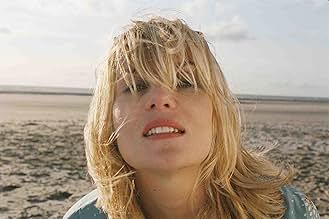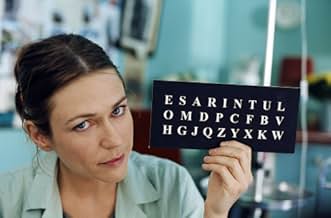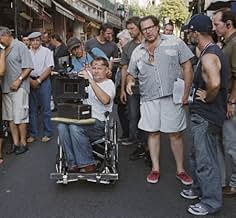IMDb-BEWERTUNG
8,0/10
111.919
IHRE BEWERTUNG
Die wahre Geschichte von Elle-Redakteur Jean-Dominique Bauby, der nach einem Schlaganfall mit einem fast völlig gelähmten Körper leben muss; nur das linke Auge kann er noch bewegen.Die wahre Geschichte von Elle-Redakteur Jean-Dominique Bauby, der nach einem Schlaganfall mit einem fast völlig gelähmten Körper leben muss; nur das linke Auge kann er noch bewegen.Die wahre Geschichte von Elle-Redakteur Jean-Dominique Bauby, der nach einem Schlaganfall mit einem fast völlig gelähmten Körper leben muss; nur das linke Auge kann er noch bewegen.
- Regie
- Drehbuch
- Hauptbesetzung
- Für 4 Oscars nominiert
- 68 Gewinne & 107 Nominierungen insgesamt
Empfohlene Bewertungen
The immersion into the life of a man that is a part of a horrific event, where just about all seems lost and where he becomes literally trapped with in his own body can be heart-achingly depressing, however, it was actually, due to poetic direction, a mesmerizing, stylistic and somewhat uplifting story. The air was a little sweeter, after the viewing since life becomes more appreciated. This movie helps you appreciate the finer things in life and realize all that we take for granted.
Giving the film a surreal feel as though in a dream we witness a collage of memories, imaginations and actual dreams. From this, along with actual visits from loved ones we get an understanding of the man's life before the accident. It is filmed from the stroke victim's point of view. You see exactly what he sees, such as when his eye gets weak and things get blurry. We are also exposed to the man's thoughts as we hear him talking to the people about his feelings and what he wants to say despite being mute, and not being heard by the people. His thoughts give realness to the character and show us that he is still human. He even finds humor in his situation and says, to the nurse that doesn't hear him, "you need to get a sense of humor".
Overall a message about life. At the peak of this mans life an extremely severe paralysis befalls him. At first understandably pitying himself he is able to find some humor in his situation, (and parts of the movie actually make you laugh) and then inspiration. Inspiration stemming from realization that his imagination and memory are in tact. He can feel good using his mind and can even be creative and productive.
Giving the film a surreal feel as though in a dream we witness a collage of memories, imaginations and actual dreams. From this, along with actual visits from loved ones we get an understanding of the man's life before the accident. It is filmed from the stroke victim's point of view. You see exactly what he sees, such as when his eye gets weak and things get blurry. We are also exposed to the man's thoughts as we hear him talking to the people about his feelings and what he wants to say despite being mute, and not being heard by the people. His thoughts give realness to the character and show us that he is still human. He even finds humor in his situation and says, to the nurse that doesn't hear him, "you need to get a sense of humor".
Overall a message about life. At the peak of this mans life an extremely severe paralysis befalls him. At first understandably pitying himself he is able to find some humor in his situation, (and parts of the movie actually make you laugh) and then inspiration. Inspiration stemming from realization that his imagination and memory are in tact. He can feel good using his mind and can even be creative and productive.
The former France ELLE editor Jean-Dominique Bauby quoted his life as being trapped in a diving bell and free like a butterfly, and that was how he describes his life after a stroke left him only able to blink his left eye. The Diving Bell and The Butterfly has become the title of his memoirs, which has become a best seller which Bauby will never get to see.
American born director Julian Schnabel picked up the memoir and made it into a movie that will re-examine the way a person will view his life. From the way the movie was presented to the audience, it might seems to be difficult to digest, but if you watch them once again, you will find that the flow of the movie follows closely to what is written on the book.
The story begins with Jean Dominique (Mathieu Amalric) finding himself woke up in a hospital,unable to move his body. Upon hearing from the doctor that a stroke left him unable to move, except his left eye, he found himself trapped in a prison: his body. He describes his body as a diving bell, where death sentence prisoner would wore the diving bell and drowned in the sea. With doctors and therapists taking care of him, he found himself living without dignity.
With the help of Henriteet (Marie Jozee Croze), a speech therapist, she uses a unique method of communicating with Jean thru pronouncing the alphabets and Jean would form a word or sentence by blinking the eye. After getting to know her much more better, Jean found his way to survive thru the disabilities: imagination and beautiful memories. Both set his spirit free, and he feels like he is flying like a butterfly. And thus he began writing his memoirs of his life.
The story is told through the view from Jean's left eye and reaction in his mind after the stroke. This pulls the audience and the inner world of Jean closer, and audience could have a feel of putting themselves into Jean's shoes. From the effort the cast and crew puts in the movie, we can tell that the movie is follow everything accordingly to the book, without any adjustments.
The Diving Bell and the Butterfly is the movie that you need if you want to take a break from normal popcorn flicks, or a movie that makes you think through about yourself, and how you live life to the fullest.
American born director Julian Schnabel picked up the memoir and made it into a movie that will re-examine the way a person will view his life. From the way the movie was presented to the audience, it might seems to be difficult to digest, but if you watch them once again, you will find that the flow of the movie follows closely to what is written on the book.
The story begins with Jean Dominique (Mathieu Amalric) finding himself woke up in a hospital,unable to move his body. Upon hearing from the doctor that a stroke left him unable to move, except his left eye, he found himself trapped in a prison: his body. He describes his body as a diving bell, where death sentence prisoner would wore the diving bell and drowned in the sea. With doctors and therapists taking care of him, he found himself living without dignity.
With the help of Henriteet (Marie Jozee Croze), a speech therapist, she uses a unique method of communicating with Jean thru pronouncing the alphabets and Jean would form a word or sentence by blinking the eye. After getting to know her much more better, Jean found his way to survive thru the disabilities: imagination and beautiful memories. Both set his spirit free, and he feels like he is flying like a butterfly. And thus he began writing his memoirs of his life.
The story is told through the view from Jean's left eye and reaction in his mind after the stroke. This pulls the audience and the inner world of Jean closer, and audience could have a feel of putting themselves into Jean's shoes. From the effort the cast and crew puts in the movie, we can tell that the movie is follow everything accordingly to the book, without any adjustments.
The Diving Bell and the Butterfly is the movie that you need if you want to take a break from normal popcorn flicks, or a movie that makes you think through about yourself, and how you live life to the fullest.
Earlier this year, a good friend, avid reader and film buff informed me that one of her favorite books was the basis for a film which recently won awards at the 2007 Cannes Film Festival. I knew nothing of the novel or the film so she offered me the book to read. I enjoyed the story but didn't completely appreciate its depth until I recently got a sneak peek at the film.
The Diving Bell and the Butterfly is about Jean-Dominique Bauby, (Mathieu Amalric) a popular editor of the French fashion magazine 'Elle.' At age 43 he is stricken with a stroke leaving him with lock-in syndrome, a medical condition that, except for his left eye, rendered him completely immobile. In fear of his right eye becoming "septic" doctors quickly stitched the eye shut.
This sealing of that eye is an early scene, which is so perfectly shot that it places you inside Bauby's head and body, and keeps you there for the entire film. You see the world as he views it while desiring to be free of the paralyzing feeling of a sinking diving bell. At other times, with his imagination, you find yourself fluttering as free as a butterfly.
Bauby wrote his story with the use of a unique sequence of letters specifically designed so he could blink his eye to communicate as he created every single word of his story.
This film is in no way depressing. The cinematography is brilliantly captured. Everyone was completely captivated by the screenplay as we experienced life deep inside Bauby's body, mind and soul. For the entire 2+ hours, you won't want to be anyplace else.
The Diving Bell and the Butterfly is about Jean-Dominique Bauby, (Mathieu Amalric) a popular editor of the French fashion magazine 'Elle.' At age 43 he is stricken with a stroke leaving him with lock-in syndrome, a medical condition that, except for his left eye, rendered him completely immobile. In fear of his right eye becoming "septic" doctors quickly stitched the eye shut.
This sealing of that eye is an early scene, which is so perfectly shot that it places you inside Bauby's head and body, and keeps you there for the entire film. You see the world as he views it while desiring to be free of the paralyzing feeling of a sinking diving bell. At other times, with his imagination, you find yourself fluttering as free as a butterfly.
Bauby wrote his story with the use of a unique sequence of letters specifically designed so he could blink his eye to communicate as he created every single word of his story.
This film is in no way depressing. The cinematography is brilliantly captured. Everyone was completely captivated by the screenplay as we experienced life deep inside Bauby's body, mind and soul. For the entire 2+ hours, you won't want to be anyplace else.
One of the best films in years, and in artistic cinematic terms, one of the best films I've ever seen. That's a heavy statement to make, but off the top of my head, I cannot think of another film that explores the inner workings of a character so intimately and believably, while blending cinematography, sound effects, and musical score in such harmony -- but in a fashion we (as American's at least) are not trained to enjoy. I felt the French influence strongly cinematically and, of course in the dialogue, but the writing and acting was so fluid it felt like the subtitles weren't even there.
The film deals with a rare physical condition, and I was physically there with the character from start to finish. I felt each moment as if it were my own. That is a rare accomplishment in cinema. Julian Schnabel directed a stellar cast. Mathieu Amalric was unusually charming as Jean-Dominique Bauby, and Max Von Sydow was heartbreaking as his lonely widower father. The female leads were all equally impressive as they were beautiful. I don not mean to generalize them, but they were all so excellent that they blend seamlessly in my mind, in terms of performance.
Overall, this film was as pure a cinematic experience as I've witnessed in a long time. A true artist turns out a film that is truly a piece of art. Julian Schnabel takes his time in between films, but with work like this, there's no need to rush. Like a good painting, one can enjoy it for a lifetime.
The film deals with a rare physical condition, and I was physically there with the character from start to finish. I felt each moment as if it were my own. That is a rare accomplishment in cinema. Julian Schnabel directed a stellar cast. Mathieu Amalric was unusually charming as Jean-Dominique Bauby, and Max Von Sydow was heartbreaking as his lonely widower father. The female leads were all equally impressive as they were beautiful. I don not mean to generalize them, but they were all so excellent that they blend seamlessly in my mind, in terms of performance.
Overall, this film was as pure a cinematic experience as I've witnessed in a long time. A true artist turns out a film that is truly a piece of art. Julian Schnabel takes his time in between films, but with work like this, there's no need to rush. Like a good painting, one can enjoy it for a lifetime.
Saw this last night in Brussels (it's been on release for a while now). I was worried that it would be arty and depressing, but I was pleasantly surprised by how absorbing and moving it was. The opening scenes are striking, and communicate well the main character's feelings of claustrophobia and helplessness in the immediate aftermath of his accident, but as he attempts to rebuild his life and learn how to communicate, the film (and the visual style) opens up, even making room for some welcome flashes of humour. Performances are excellent, but the real stars here are the writer(s) and director, for taking us so convincingly into the character's world.
Wusstest du schon
- WissenswertesTo familiarize himself with Bauby's sheltered existence, director Julian Schnabel made the movie in the same hospital where Bauby was treated, meeting many of the orderlies who had treated him. He also shot scenes on the same balcony where Bauby relaxed, and on the same nearby beach to which his family had taken him.
- PatzerWhen Jean-Dominique goes on a boat ride, a 'Speedferries' vessel can be seen in the background. Speedferries started business in 2004, years after the movie was set.
- Zitate
Jean-Dominique Bauby: I decided to stop pitying myself. Other than my eye, two things aren't paralyzed, my imagination and my memory.
- SoundtracksTheme for The Diving-Bell and the Butterfly
Composed by Paul Cantelon
Studio recording The University of Victoria
Engineer / Producer Russell Dawkin
Top-Auswahl
Melde dich zum Bewerten an und greife auf die Watchlist für personalisierte Empfehlungen zu.
Details
- Erscheinungsdatum
- Herkunftsländer
- Offizieller Standort
- Sprache
- Auch bekannt als
- El llanto de la mariposa
- Drehorte
- Produktionsfirmen
- Weitere beteiligte Unternehmen bei IMDbPro anzeigen
Box Office
- Bruttoertrag in den USA und Kanada
- 6.003.227 $
- Eröffnungswochenende in den USA und in Kanada
- 75.721 $
- 2. Dez. 2007
- Weltweiter Bruttoertrag
- 19.780.116 $
- Laufzeit1 Stunde 52 Minuten
- Farbe
- Sound-Mix
- Seitenverhältnis
- 1.85 : 1
Zu dieser Seite beitragen
Bearbeitung vorschlagen oder fehlenden Inhalt hinzufügen

Oberste Lücke
What is the Hindi language plot outline for Schmetterling und Taucherglocke (2007)?
Antwort







































